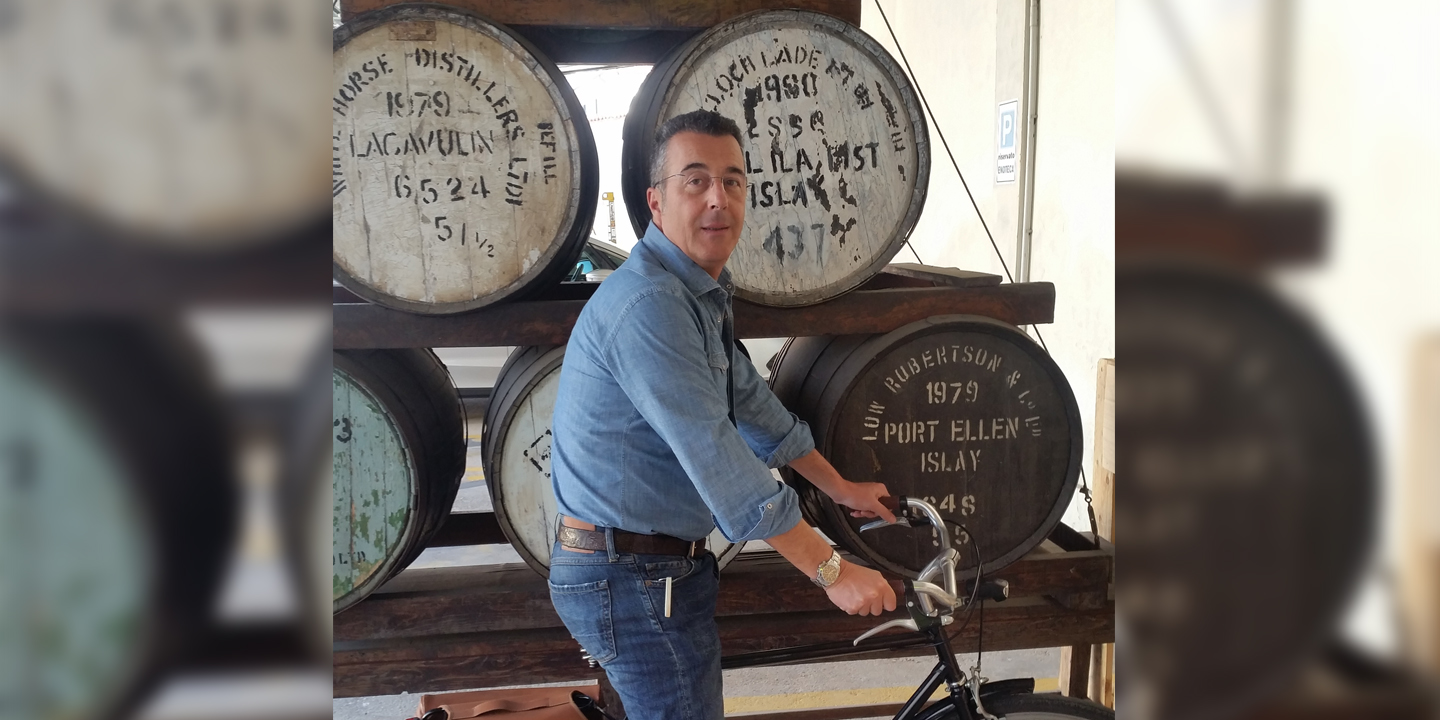Interview With Wilson & Morgan – Italian Independent Bottler
Interview, Learn Whisky
Italian independent bottlers Wilson & Morgan are a great example of the innovation, creativity and international collaboration upon which the independent bottling industry thrives. A truly family business, chairman Fabio Rossi follows in the footsteps of his grandfather and his father Giuseppe and father Mario, who first started importing fine whiskies from Scotland. We had the great pleasure of speaking to their brand ambassador Luca Chichizola, who is co-responsible for selecting casks alongside Fabio.
Wilson & Morgan have described their practice as “the Italian way to Scotland’s finest whiskies”, with the beautiful image of “Robert Burns meets the Merchant of Venice”. Luca, why do you think this marriage of Italian and Scottish practices have been so successful?
There definitely must be something about Italy that explains why the independent bottlers scene is so interesting. We ourselves have asked why several times. One possible explanation: Italy has always held some sort of “nostalgic” fascination for the exotic stuff, and in particular all that was somehow linked in imagery and style to Old Britain (including of course Scotland) has been seen as “elegant and distinguished”. This began in particular in the 1960s.
Whisky has always been seen as something fashionable and high class, and the same was true for prestigious cars, smoking accessories (pipes and tobacco blends), etc. This of course meant two things: that there could be a market (no matter how “niche”) for these luxury products, and that we have had a long time to get to know them and build experience. Many of the old Italian independent bottlers have been Italian (the beloved Mr Samaroli, for example) and they have set a very high bar. While all the world was drinking blends, in Italy there was a certain curiosity for single malts, for the lore and tradition they evoked.
This long-time love of course does not completely explain why the marriage of Italy and Scotland is so successful, though. My idea is that Italy has a huge tradition of “eating and drinking well”, and a wine culture that rivals that of France. So, the Italian gourmets have always had the “technical capability” to appreciate Scotch whisky as a quality products, to appreciate the differences and nuances, as a result of the already trained palate. It’s not a chance that Fabio Rossi’s family has a three generation-long history of wine merchants, and then of whisky importers since the ’60s: a tradition of trained palates and great taste. In conclusion, we have love for the tradition of a land seen as “fashionable”, the appreciation and knowledge of good things, and to this we add the creativity and ingenuity that is so typically Italian.
Following the second world war, Mario Rossi took over the business from his father and began importing whisky from its land of origin, Scotland. Do you know why Mario took this bold decision?
Yes – He was an antifascist, so he collaborated with the Allied troops near Venice. He befriended some British soldiers… and tasted whisky for the first time!
I understand you and Fabio are responsible for hand-selecting the casks from distilleries in Scotland. Do you have any interesting whisky-related tales from your travels?
Actually, all the travel is done by Fabio, so that’s why it’s always hard to catch him! The story that he tells most enthusiastically relates to the early 1990s, the start of the Wilson & Morgan brand. At that time, distilleries had a huge stock of old whisky casks. In the 1980s there had been a bad recession for whisky, many distilleries had closed, and so there was a lot of stock in maturation. Fabio still remembers the huge arrays of casks, all with great whisky inside. He spent weeks going around, and he recounts with a tear in his eyes that whatever he sampled was great whisky.
Just see the names of the first releases from Wilson & Morgan in the early ’90s (bottled in association with Cadenhead): Ardbeg, Springbank, Port Ellen, old Glen Grants… All fantastic bottles (I have had the luck to taste a couple of them) that today would fetch a crazy price. Nowadays there is less selection, and what is available is often of very young casks. And somehow it has become a less charming activity, when you can send an email and ask for samples rather than having to go to the distilleries in a quest for whisky. So yes, the best travel memories for Fabio are all the tastings he had in that period of “El Dorado”.
How do you decide the best maturation method for the whiskies you have selected?
Usually we taste our own stock every 6 months. We sometimes buy young whiskies, sometimes older ones, but once they become “Wilson & Morgan stock”, we monitor them very often. Especially if we have changed the cask with a fresh sherry or marsala one. We compare notes with the previous tasting, and see if there is a trend in evolution, or if maturation has become stationary, so we can predict whether to wait some more or bottle. And by experience we also know that a certain malt matures well in a certain kind of cask, or if it’s useless to wait too much.
You pick only the highest qualities whiskies that have not been chill-filtered. Why is it important to you that your whiskies are non chill-filtered?
We think that there is no need to chill-filter, once the ABV is higher than 46%. We are not sure that everyone is able to discern between a whisky that has been chill-filtered and one that hasn’t, but we often do (it’s a matter of presence and thickness on the palate), and in doubt we prefer not to. Especially since we only see potential drawbacks and no advantages in filtering.
The Wilson & Morgan Longmorn 1990-2002 was the first ever whisky with a marsala finish, and has since been copied numerous times. What do you think is most special about whisky finished in marsala casks? And what inspired you to try this method?
Quite simply, Fabio knows De Bartoli, the Sicilian producer who makes an excellent marsala. Actually, there is quite a similarity in taste between quality marsala and quality sherry. Both can be drier or sweeter according to how they are made, both retain a nutty and fruity quality, both are served as an after-dinner wine.
Of course, the production methods differ (marsala is a fortified wine), but the final results not that much. After all, marsala was very loved by the British as an alternative to sherry, so it’s not completely unknown in the UK (although it has become quite out of fashion). So, the thought was: we love sherry cask matured whisky, so why shouldn’t we love marsala cask matured whisky too? And it was successful!
Two things had to be taken into account after several experiments: first, fresh marsala casks can be much more dominating than sherry, so moderation must be applied in the period of maturation; second, only some distilleries really shine with Marsala casks. For example, the association with peat can be…. weird (although sometimes not bad at all).
We’re very excited to have three of your whiskies that are not available anywhere else, ‘Whisky Foundation exclusives’. These are the Bunnahabhain 15 year old, Tobermory 21 year old and Macallan 25 year old, all three matured in sherry casks. For you personally, what does the sherry cask finish bring to the spirit?
We love sherry casks! It has to do with being used to the taste of the old great Macallans. Actually, we love peat, too, but when we see a whisky with a natural ruby colour, and that fruity/nutty smell, we can’t resist. We love sherry so much that we have found our own secret sources for sherry casks in Spain, because we were no longer satisfied with the quality of sherry casks that were being used in Scotland (or at least the ones that were used for whiskies to be sold to independents).
The acclaimed spirits writer Michael Jackson referred to Fabio as the ‘whisky tailor’, a term that he’s embraced. What makes this term an apt comparison?
Fabio has told me many times he believes himself to be a tailor because, as Michael Jackson intended, he likes to create small craft bottlings each with a particular mark of distinction. Like a tailor, he likes to have elegant variations in his all creations, and so not two of them are alike. However, being a tailor, all of them bear his mark of distinction nonetheless. A good tailor always has his “recognizable style” even between two very different kinds of dresses.
How do you personally enjoy your whisky, and do you have any favourites?
We enjoy whisky for pleasure as an after-dinner (for work… well, almost at every other time) with a drop of water. Fabio’s favourites are Caol Ila and Macallan, mine too but I also love Talisker (although it’s impossible to find it as an independent) and Clynelish. In recent years we’ve had a lot of fun with Tobermory/Ledaig: very underrated malts, with good cask selection and maturation they can be a surprise. Ah, and of course we love Bowmore: when it’s great, it really is great. I love the 12 year old in a brown dumpy bottle that was imported by Fabio’s father in the early 1980s.
(Luca may be pleased to learn that we have found an independent bottling by Talisker, this Talisker 5 year old from Kingsbury!)
What would you say are the benefits to choosing a whisky from an independent bottler such as yourself?
Fabio has always liked the idea of offering great malts at a fair price. A couple of years ago there was a Port Ellen that was as good as the official releases… but at one third of the price!
And this certainly has its appeal. But it’s certainly not the main reason. The main reason is that we want to offer variations on what the official bottlings have to say in terms of flavours, ABV, cask selection, etc. We don’t simply want to replicate the flavours of the official bottlings.
Being a tailor, Fabio wants to give his touch. Whether it’s by selecting a particularly interesting cask, or by adding some years of maturation in a fresh sherry butt, or by using marsala… If the distillery offers a 12 year old in bourbon casks at 46%, Wilson & Morgan will be delighted to offer you a 20 year old in sherry casks and at cask strength. Diversity, not having to drink always the same: that is where an independent becomes interesting. And of course, if one likes the style and agrees with our taste, he can be pretty sure that he can blindly buy any bottle in our catalogue and be satisfied: that is how Wilson & Morgan has built a loyal fan base. If we don’t like, we don’t bottle it. Simple as that!
Many thanks to Luca for a wonderful and insightful interview, we are very glad to continue working with Wilson & Morgan.



